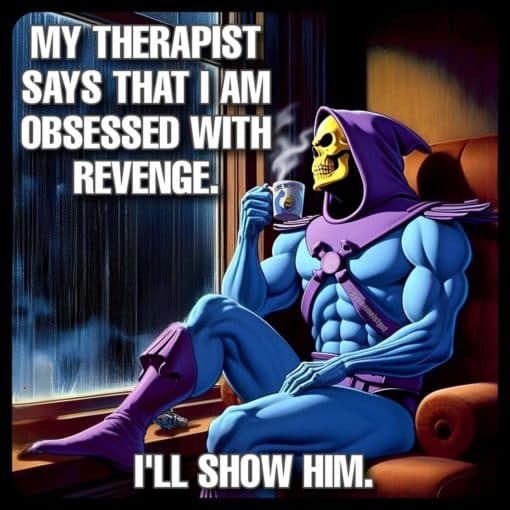MY THERAPIST SAYS THAT I AM OBSESSED WITH REVENGE I LL SHOW HIM
The image showcases an illustration of a well-known animated character who is wearing a purple hood and cape, with a blue muscular body, and a skull for a face. The character is casually seated in a plush, brown armchair, in a relaxed pose with one leg crossed over the other, exuding an air of nonchalance. The setting appears to be a cozy interior space, hinted by the wooden floor and heavy curtains draping a window behind the armchair, giving off a homey vibe.
In the character's hand, there's a small mug, which emits a steamy trail suggesting the presence of a hot beverage. The mug has a humorous label that reads "De-Boner", adding an additional layer of light-heartedness to the image. This is a playful element that contrasts sharply with the character's rather intimidating skeletal appearance, setting a tone that balances the macabre with the comedic.
Above the character, in bright, bold lettering, a caption reads "MY THERAPIST SAYS THAT I AM OBSESSED WITH REVENGE." This introduction of a therapist and the concept of obsession with revenge creates an immediate comedic juxtaposition -- we are not accustomed to seeing fearsome, villainous characters seeking psychological help, let alone discussing their emotional issues.
In a smaller font right at the bottom of the image, there's a punchline that completes the caption. It states, "I'LL SHOW HIM." This declaration is the twist that likely elicits humor. It is a literal interpretation of being obsessed with revenge – the character is humorously misunderstanding the therapist's probably clinical concern as a challenge to be met or an affront to be avenged.
The humor in the image is further amplified by the contrast between the character's menacing design and the everyday human activity of enjoying a hot drink while comfortably lounging. This creates a comedic dissonance; we do not typically associate skeletal, sinister figures with such relaxed and mundane pastimes.
Lastly, the humor may resonate on an ironic level because it playfully mocks the concept of self-awareness and change. The character is seemingly oblivious to the need for introspection or the desire to address their stated issue. This mock defiance towards personal growth and the exaggerated hubris of wanting to "show" the therapist, while clinging to the very trait being called into question, speaks to a universally relatable form of stubborn human nature, which can be quite amusing to observe from an outside perspective. MY THERAPIST SAYS THAT I AM OBSESSED WITH REVENGE I LL SHOW HIM
